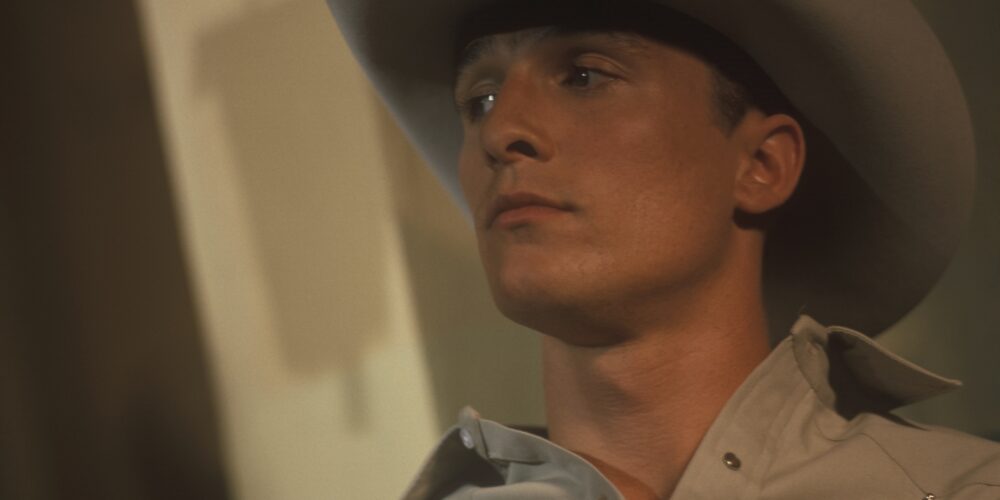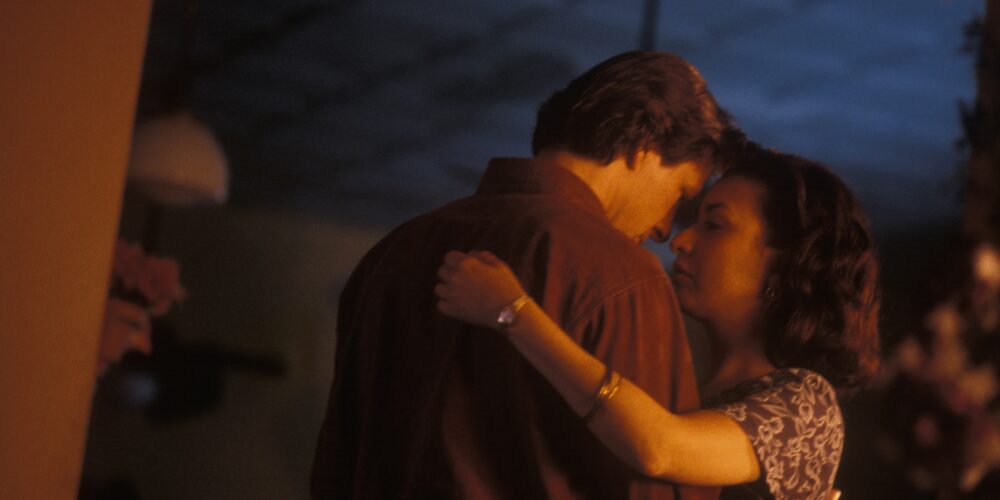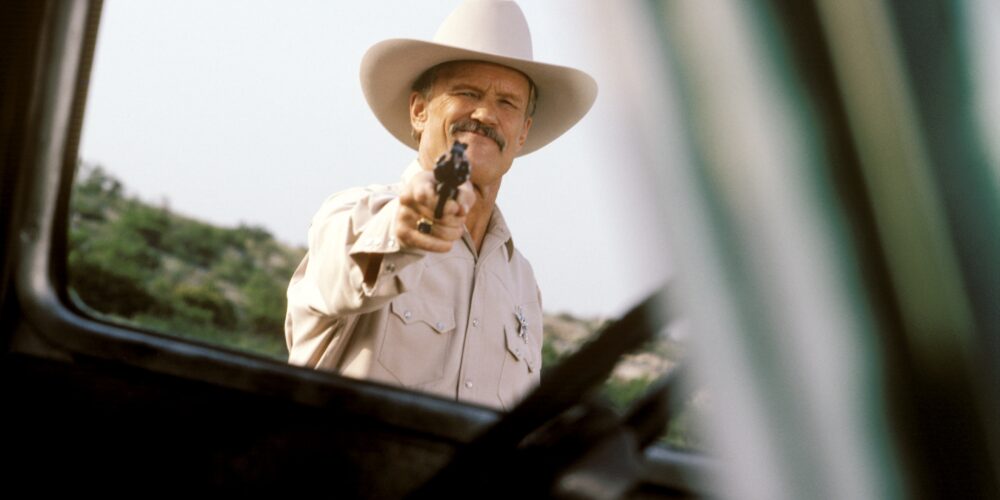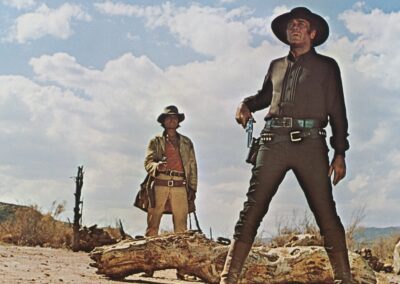“Lefty” filmmaker John Sayles wrote and directed an extraordinary run of intelligent, small-scale independent American movies in the 1990s and early 2000s. Not bad for a guy I first got to know as the scriptwriter of several low budget shockers in the 1980s, including Alligator, The Howling and Piranha. One of the best of his pictures – the Oscar nominated neo-Western Lone Star (1996) is screening at the UPP at the end of the month as part of the short ‘To Catch a Killer’ season and it’s a film well worth a look (and a good one to revisit if you’ve not seen it since its first release 25 years ago).
Although Sayles worked in a number of genres, he is usually considered to be a (minor) auteur due to the fact that he often collaborated with the same actors and crew and his films tend to be about communities, diversity, and how mismatched individuals approach events from wildly different perspectives – all themes very relevant to a contemporary world, torn apart, as it is, by division, hatred and intolerance. He’s not a well-known director but his work is solid, well-crafted, and always food for thought: something, arguably, missing from much contemporary American cinema today.
He started off working as a screenwriter for Roger Corman’s New World movies (which puts him up with Coppola, Jack Nicholson, Joe Dante and Scorsese, amongst others, who all also got early breaks working for the maverick “quickie” producer – Coppola repaid the favour casting him in a minor role in The Godfather Part Two) and used money he made from these movies to fund his first film as director The Return of the Secaucas Seven in 1980. This was one of those films, like Lawrence Kasdan’s subsequent 1983 breakthrough The Big Chill, which dealt with former University friends reuniting after some years with tragic-comic results. The film had a tiny budget ($30,000) but was critically and commercially successful and allowed Sayles to work thereafter as an independent filmmaker (and occasional script doctor – he rewrote Ron Howard’s Apollo 13, for example) with both, ahead of its time lesbian love story Lianna and nostalgic Baby It’s You following along in 1983.

But it was in the 1990s that he really hit his stride, making a run of thought-provoking, brilliantly acted and impeccably written (minor) films dealing with complex ideas about politics and history (City of Hope and Men With Guns); childhood and place (The Secret of Roan Inish) and survival (Limbo – which has to have one of the most infuriating “open endings” of the decade). During his career Sayles also introduced movie goers to a great number of solid character actors who did good work for him early in their careers, including David Strathairn (with whom he went to college) and Chris Cooper (who takes the main role in Lone Star). Rather like Woody Allen or Robert Altman, Sayles has always managed to attract a number of better known stars to appear in his work – often taking minor roles but providing his films with a bit of star wattage – Kris Kristofferson, Frances McDormand, and Mattthew McConaughey all turn up in Lone Star; Sunshine State (2002) featured Timothy Hutton, Mary Steenburgen and Edie (Carmella Soprano) Falco; Silver City (2004) attracted Richard Dreyfuss, Danny Huston, Daryl Hannah and Tim Roth (amongst others); and 2007’s Honeydripper (his last film to be widely released in the UK) featured Danny Glover and Stacey Keach. Sayles, renowned for his writing, always providing interesting roles for his cast and although his stories often focus upon men, his female characters also give his actresses something to work with (as you will see in Lone Star – Elizabeth Pena’s character is delightful).

It’s also worth noting that whilst he has a reputation for being a very articulate writer of dialogue; often using “tricksy” narrative devices akin to those found in great novels (Lone Star gained him an Oscar nomination for best screenplay) it shouldn’t be overlooked that Sayles is, first and foremost, a filmmaker and his movies are always shot with great skill by an impressive array of cinematographers. For example, the legendary Haskell (In the Heat of the Night, The Conversation, and One Flew Over the Cuckoo’s Nest) Wexler worked with him on Matewan, Roan Inish, Limbo and Silver City (which turned out to be Wexler’s last film); Scorsese and Oliver Stone “go to guy” Robert Richardson lensed City of Hope; the renowned Roger Deakins did the cinematography on Passion Fish (1992) and regular Mike Leigh collaborator Dick Pope shot Honeydripper.
Kevin Costner’s recent critical and commercial disaster Horizon seemed to suggest that the western genre has finally kicked the bucket once and for all – but not so the neo-Western. In this century there have been a great many excellent examples of this genre, which takes a modern look at the themes and attitudes of the traditional Western and provides audiences with a contemporary spin on its ideas and values. The most successful, of course, is the Coen brothers’ 2007 Oscar-winning take on Cormac McCarthy’s No Country for Old Men (until recently an A Level Film Studies set text) but other titles worth checking out include Ain’t Them Bodies Saints (from Green Knight director David Lowery); both Tommy Lee Jones’ The Three Burials of Melquiades Estrada and The Homesman (the latter highly recommended, as is Glendon Swarthout’s original novel – a masterpiece); Ang Lee’s heartbreaking Brokeback Mountain; Jim Sheridan’s terrific Hell or High Water and Wind River; Scott Cooper’s brilliant Hostiles and, just in case you thought this was all getting a bit male dominated, we should also include Kelly Reichert’s Meek’s Crossing and, of course, Jane Campion’s Oscar-winning Power of the Dog.

Lone Star with its clever use and subversion of classic Western tropes fits nicely into this genre. It’s also, like all of Sayles’ work, a movie with a lot of heart and features one of the most unexpectedly charming endings of the 90s. One which you really don’t see coming but will stick with you long after the movie is over.
The original tagline on the poster for Lone Star read “John Sayles invites you to return to the scene of the crime.” Nearly 30 years later, the UPP is opening its doors to allow you to return to the scene of the crime. Again. As we now know, from the myriad “cold cases” TV shows, films, and books that appear to proliferate today, sometimes you need to revisit the past in order to make sense of the present.
Watching Lone Star (again?) on the big screen allows audiences to do just that.
Dr Andrew C Webber is a Film teacher and examiner with over 37 years’ experience. He currently contributes to both the Cinema of the 70s and 80s magazines (available on Amazon); cassette gazette fanzine (available from cassette pirate on e-bay) and the Low Noise music podcast available on Spotify and Apple podcasts.


